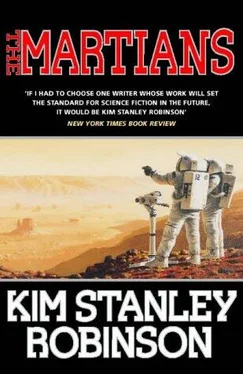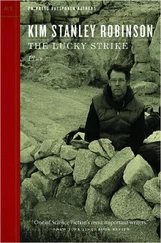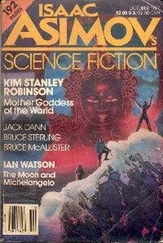“Yeah.” Stephan laughs. “Pretty invigorating out there all right.”
“The Scots,” Arthur says, giggling away. “Martian Scots, no less. I can’t believe it.”
“It’s not just the Scots are strange,” Roger points out. “What about you, Arthur? I notice you getting quite a giggle out of all this yourself, eh?”
“Oh yeah, yeah,” Arthur says. “I’m having a good time. Aren’t you? I’ll tell you, once we got on the oxygen I started feeling great. Before that it wasn’t so easy. The air seemed really thin, I mean really thin. Elevations here don’t mean anything to me, I mean you haven’t got a proper sea level so what does elevation really mean, right? But your air is like nothing, man. So when we got on the bottle I could really feel the difference. A lifesaver. And then there’s the gravity! Now that’s wonderful. What is it, two-fifths of a gee? Practically nothing! You might as well be on the moon! As soon as I learned to balance properly, I really started to have a good time. Felt like Superman. On this planet it just isn’t that hard to go uphill, that’s all.” He laughs, toasts the other two with tea, “On Mars, I’m Superman.”
High-altitude pulmonary edema works fast, and one either succumbs or recovers very quickly. When Stephan’s lungs are completely clear Hans orders him to keep on maximum oxygen intake, and he is given a light load and ordered to take it slow and only move up from one low camp to the next. At this point, Roger thinks, it would be more difficult to get him back down the cliff than keep on going to the top—a common enough climbing situation, but one that no one talks about. Stephan complains about his reduced role, but agrees to go along with it. For his first few days back out Roger teams with him and keeps a sharp eye on him. But Stephan climbs fairly rapidly, and only complains about Roger’s solicitousness, and at the cold winds. Roger concludes he is all right.
Back to portering. Hans and Arthur are out in the lead, having a terrible time with a broad, steep rampart that they are trying to force directly. For a couple of days they are all stalled as the camps are stocked, and the lead party cannot make more than fifty or seventy-five meters a day. One evening on the radio while Hans describes a difficult overhang, Marie gets on the horn and starts in. “Well, I don’t know what’s going on up there, but with Stephan sucking down the oxygen and you all making centimeters a day we’re going to end up stuck on this damn cliff for good! What? I don’t give a fuck what your troubles are, mate—if you can’t make the lead you should bloody well get down and let somebody on there who can!”
“This is a big tuff band,” Arthur says defensively. “Once we get above this it’s more or less a straight shot to the top—”
“ If you’ve got any bloody oxygen it is! Look what is this, a co-op? I didn’t join a fucking co-op!”
Roger watches Eileen closely. She is listening carefully to the exchange, her finger on the intercom, a deep furrow between her eyes, as if she is concentrating. He is surprised she has not already intervened. But she lets Marie get off another couple of blasts, and only then does she cut in. “Marie! Marie! Eileen here—”
“I know that.”
“Arthur and Hans are scheduled to come down soon. Meanwhile, shut up.”
And the next day Arthur and Hans put up three hundred meters of fixed rope and top the tuff band. When Hans announces this on the sunset radio call (Roger can just hear Arthur in the background, saying in falsetto, “So there! So there!”), a little smile twitches Eileen’s mouth before she congratulates them and gets on to the orders for the next day. Roger nods thoughtfully.
After they get above Hans and Arthur’s band, the slope lies back a bit and progress is more rapid, even in the continuous winds. The cliff is like a wall of immense irregular bricks which have been shoved back, so that each brick is set a bit behind the one below it. This great jumble of blocks and ledges and ramps makes for easy zigzag climbing, and good campsites. One day, Roger stops for a break and looks around. He is portering a load from middle camp to high camp, and has gotten ahead of Eileen. No one in sight. There is a cloud layer far below them, a gray rumpled blanket covering the whole world. Then there is the vertical realm of the cliff face, a crazed jumble of a block wall, which extends up to a very smooth, almost featureless cloud layer above them. Only the finest ripples, like waves, mar this gray ceiling. Floor and ceiling of cloud, wall of rock: It seems for a moment that this climb will go on eternally; it is a whole world, an infinite wall that they will climb forever. When has it been any different? Sandwiched like this, between cloud and cloud, it is easy not to believe in the past; perhaps the planet is a cliff, endlessly varied, endlessly challenging.
Then in the corner of Roger’s eye, a flash of color. He looks at the deep crack between the ledge he is standing on and the next vertical block. In the twisted ice nestles a patch of moss campion. Cushion of black-green moss, a circle of perhaps a hundred tiny dark pink flowers on it. After three weeks of almost unrelieved black and white, the color seems to burst out of the flowers and explode in his eyes. Such a dark, intense pink! Roger crouches to inspect them. The moss is very finely textured, and appears to be growing directly out of the rock, although no doubt there is some sand back in the crack. A seed or a scrap of moss must have been blown off the shield plateau and down the cliff, to take root here.
Roger stands, looks around again. Eileen has joined him, and she observes him sharply. He pulls his mask to the side. “Look at that,” he says. “You can’t get away from it anywhere.”
She shakes her head. Pulls her mask down. “It’s not the new landscape you hate so much,” she says. “I saw the way you were looking at that plant. And it’s just a plant after all, doing its best to live. No, I think you’ve made a displacement. You use topography as a symbol. It’s not the landscape, it’s the people. It’s the history we’ve made that you dislike. The terraforming is just part of it—the visible sign of a history of exploitation.”
Roger considers it. “We’re just another Terran colony, you mean. Colonialism—”
“Yes. That’s what you hate, see? Not topography, but history. Because the terraforming, so far, is a waste. It’s not being done for any good purpose.”
Uneasily Roger shakes his head. He has not thought of it like that, and isn’t sure he agrees: It’s the land that has suffered the most, after all. Although—
Eileen continues, “There’s some good in that, if you think about it. Because the landscape isn’t going to change back, ever. But history—history must change, by definition.”
And she takes the lead, leaving Roger to stare up after her.
The winds die in the middle of the night. The cessation of tent noise wakes Roger up. It is bitterly cold, even in his bag. It takes him a while to figure out what woke him; his oxygen is still hissing softly in his face. When he figures out what did it, he smiles. Checking his watch, he finds it is almost time for the mirror dawn. He sits up and turns on the stove for tea. Eileen stirs in her sleeping bag, opens one eye. Roger likes watching her wake; even behind the mask, the shift from vulnerable girl to expedition leader is easy to see. It’s like ontogeny recapitulating phylogeny: Coming to consciousness in the morning recapitulates maturation in life. Now all he needs is the Greek terminology, and he will have a scientific truth. Eileen pulls off her oxygen mask and rolls onto one elbow.
“Want some tea?” he says.
“Yeah.”
Читать дальше
Конец ознакомительного отрывка
Купить книгу












